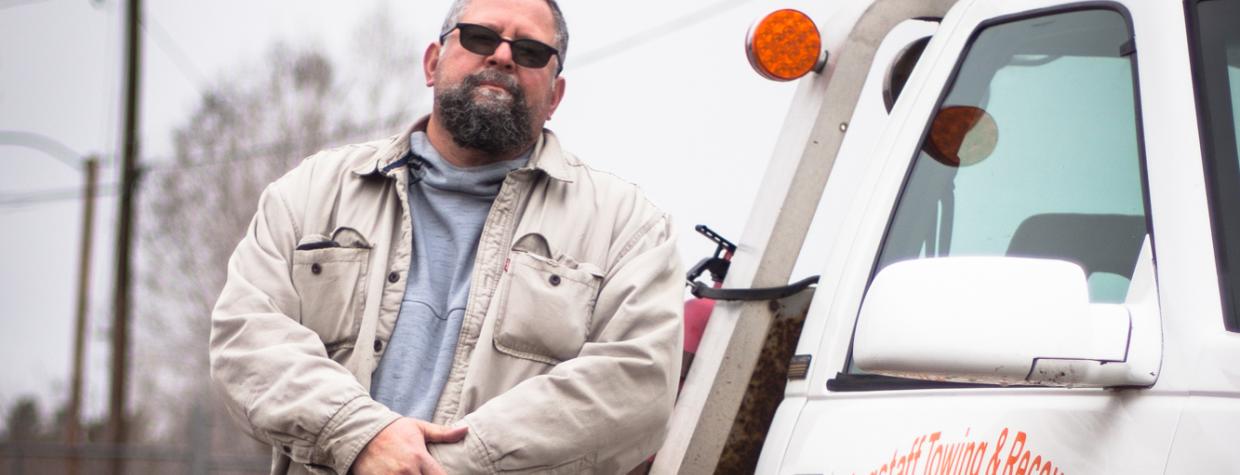The following is excerpted from Blood in the Asphalt, a new book by Arizona author Jesse Sensibar. It appears here with permission from Tolsun Books.
The burgundy 2007 Ford four-wheel drive truck was traveling west from Albuquerque, New Mexico to Kingman, Arizona when the driver lost control near Winona and rolled the truck. The owner of the truck was killed. We towed the truck to our storage yard where it was parked on the gravel in the back corner near the gate, backed in against the eight-foot chain-link fence.
In spite of the owner being deceased, I fully expected to hear from somebody about the wreck; family members would want to come and collect personal effects. In spite of being totaled, the truck still had significant salvage value. Insurance companies would be sending adjusters and possibly investigators to minimize risk and figure out cause and liability, pay tow bills, and arrange for the truck to be sold for salvage.
But nobody came. The truck sat in the storage yard for almost a month. I had a phone number for the owner’s parents, and finally I had to call and speak to the father of the owner of the truck. I said how sorry I was for his loss and explained my situation. I asked if he knows if his son had any collision insurance on the truck, and he told me that he did not. I explained to him, gently, kindly as I can, that the truck is sitting in our storage yard, and about my large towing and storage bill, but offered that the bill could be paid if I could sell the truck. If he could send me the title, I would not ever have to bother him again with any of this. He told me he would see what he could do. I told him again how sorry I was for his loss, and I apologized for having to ever bother him with this sort of thing.
A week after this conversation I received a letter from the owner’s mother which detailed the cold, callous, and heartless phone call her husband had received from a “representative” of the company. The letter went on to say that her son was carrying “valuable collectables” in the truck, and that if the towing company would send them to her, she would send us a title.
I looked in what is left of the truck because nobody else wanted to get anywhere near it if they didn’t have to. The closest thing I found to something of value was a center console full of change and a few dollar bills. I went back to my desk and filled out the paperwork to begin the lengthy process of filing with the state of Arizona for an abandoned title on the truck.
The truck sat forlornly at the back of the storage yard through the winter and into the spring, ignored, but not completely forgotten. Sometimes I looked out the window and saw it sitting at the back of the yard quietly mocking me. Mocking me for my failure to communicate with the dead owner’s father. Mocking me because in spite of my best efforts I still had come up short. Still had come across as callous and coldhearted. Mocking me by its very presence, sitting there taking up space, accruing storage fees that would never be paid. It laughed quietly at me and whispered, You could have done a better job, you could have tried a little harder, could have been a little nicer. But it only whispered, like so many other things in my busy life, and I was used to ignoring the quiet voices. At some point in the spring the title finally arrived and I was legally free to sell what was left of the truck and finally marked the tow bill “paid.”
Before we drug the truck up from the back of the yard, I decided I wanted it searched. I’d been doing this for years, and when things strike me as odd, there is usually a reason for it.
I sent my girlfriend’s 18-year-old nephew out to search the truck, and I sent one of my employees out to watch him do it. The Kid had a bad attitude. Wanted to be a hustler but he didn’t have any hustle. Wanted to be a player but he didn’t have any game. All he really did very well was smoke pot and get beat up.
I sent my driver, Purcell, out to watch him because the last thing I wanted was for the Kid to find a bunch of drugs or a gun and decide to steal it and really get himself in trouble. I told the Kid about the money in the console and said he could keep all the folding money if he brought me all the change. They disappeared and returned a half hour later. How’d you do? I asked. Purcell took off his shades and rolled his eyes. The Kid was happy. He’d found $26 and a bunch of clothes that were three or four sizes too big for him, just the way he liked them, along with one large knife. I told him he could leave the knife and sent him on his way. After the Kid left, Purcell laughed and said if I really wanted that truck searched he’d better go back to do it. I told him not to sweat it.
Later that afternoon I wandered out to the truck to check it out for myself. I noticed that the Kid’s idea of searching the truck consisted of throwing everything from inside of the cab through the missing back window and into the bed, taking out the things he wanted, and leaving everything else in the bed of the truck to be eventually picked up by the wind and scattered around my yard where someone would someday have to pick it all up. This came as no surprise to me. I’d expected nothing more from him.
I started tossing the things he had left in the bed of the truck back into the cab through the missing rear window when I picked up the shirt. It was a burgundy and black plaid with thin yellow stripes, dirty from six months in the cab of a badly rolled pickup truck with all the windows busted out of it. The first thing I noticed was that it seemed like a heavy-weight, possibly high-quality shirt. Once I shook the busted glass and chunks of dirt out it I looked at the tag. Not only was it an L.L. Bean shirt, but it was actually going to be big enough to fit me.
I checked the front chest pockets. When I squeezed one of them, something inside of it mushed flat between my fingers but then expanded like it had a little spring to it when I let go. There is only one thing in the world that does this, especially after half a year out in the weather, and from a lifetime association with pocketfuls of cash I knew exactly what it was. I was expecting to find a few dollars, some twenties, a ten and a bunch of ones. Maybe if I got lucky a hundred bucks, if not so lucky maybe 17 or 38 dollars.
What I found was 940 dollars in still new-looking $20 bills. Forty-seven $20 bills folded in half makes a nice-feeling bulge in your shirt pocket. Too thick to put in your wallet, especially on a long drive from Albuquerque to Kingman, it will make your wallet so thick that it will cause your back to hurt before very long. Sooner, rather than later, if you are a guy who already wears a shirt in size XXL-REG.
So you put it in the pocket of the shirt you are wearing on that day. That day you are going to die. That day you are going to get crushed to death by your own pickup truck as it lands on top of you in an icy ditch near Winona, Arizona on a freezing morning in January. You are not actually wearing that shirt when death comes for you because if you were it would end up in the morgue and then the Department of Public Safety evidence locker with the rest of your personal effects, but it is the shirt you are wearing that day, otherwise it would not have your 940 dollars in it, which would become my 940 dollars, because you took off your shirt before you were killed because the heater in your almost new truck worked so well. And your shirt becomes my lucky shirt, not because I found 940 dollars in it, but because I have seen so much death up so close, so many people die as you have died that I have become so familiar with it, perhaps too familiar with it. So familiar, so comfortable, that now the shirt you were wearing the day you died becomes my lucky shirt, because you died in it. Because I have seen so much, I know that it can and does happen to anyone, someone any day, every day, myself included.
But now I have your shirt, and your shirt becomes my lucky shirt, because I know that the chances of two people dying in the same shirt are slim indeed. So I wear your shirt without any remorse, without any fear, in total disregard for our social norms of shying away from death and our dead because I know that my chances of dying are high, but I know that the chances of two men, even two large men, dying in the same shirt are very, very small.
From Blood in the Asphalt by Jesse Sensibar. © 2018 Jesse Sensibar. Reprinted with permission from Tolsun Books.

